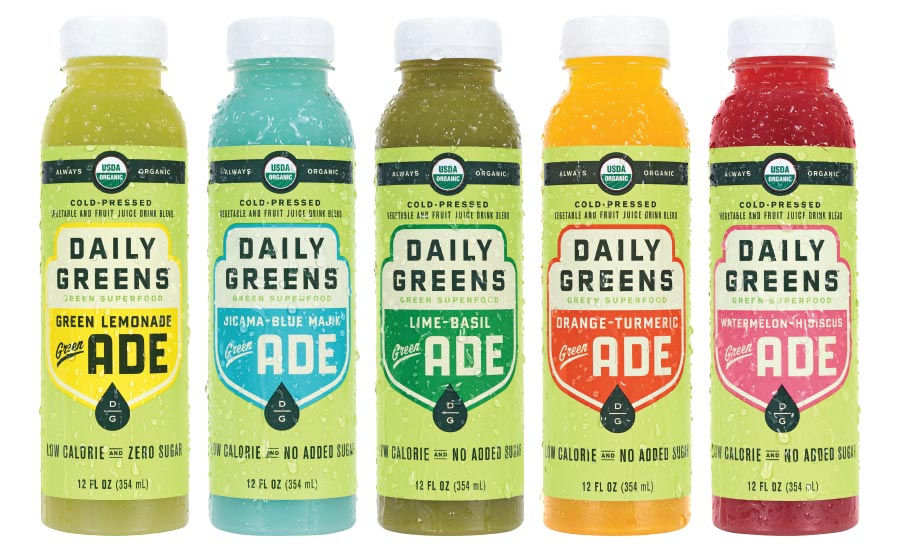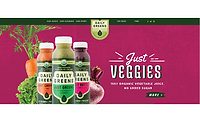For many, a life-changing event can cause them to reassess their lifestyle, priorities and much more. For Shauna Martin, founder of Austin, Texas-based Daily Greens, her everyday life was altered approximately 11 years ago when she was diagnosed with breast cancer at age 33, when her son was 1 year old. Simultaneously, Martin’s sister also was diagnosed with breast cancer.
The Centers for Disease Control and Prevention (CDC) notes that most cases of breast cancer are found in women aged 50 or older; however, young women also can be affected. About 11 percent of all new cases of breast cancer in the United States are found in women younger than 45 years of age, according to the CDC.
The CDC states that women with close relatives whom have been diagnosed with breast or ovarian cancer, particularly at age 45 or younger, are at a higher risk of getting breast cancer at an early age. However, for Martin and her sister, no family history was present. Instead her doctors theorized a contributor to the simultaneous diagnoses likely stemmed from exposure to inorganic chemicals, she says.
Faced with this challenge, Martin and her sister began living an organic lifestyle and eventually a plant-based lifestyle. Part of their regime was consuming an organic green juice every day. Today, Martin and her sister remain cancer free.
“I came to believe that the way I’m living my life and drinking a green juice every day was something that wasn’t just good for me and my breast cancer, but it was something good for everybody,” Martin says. “I really believe if everybody in our country could consume a green juice every day, we wouldn’t be in the health crisis we are in currently. I think that it changes the way that you eat throughout the rest of the day.”
About four years ago, Martin made that belief a reality when she started selling her green juices at an Austin, Texas, farmers market. Although Martin was accustomed to drinking raw green juice, to be able to sell her juices commercially, she needed to find a processing solution that preserves the nutrients but also ensures food safety.
Through her research, Martin learned about high-pressure processing (HPP), a cold pasteurization technique. This resulted in her cold-calling the chief executive officer of Wholly Guacamole due to Martin’s knowledge of the company using HPP and the quality of its products, she says. Through that connection, Martin established a relationship with an HPP processing contract facility in Dallas. After the juices were made at the Daily Greens’ facility in Austin, they were transported in a refrigerated truck to Dallas for HPP processing and then brought back to Austin that same day.
Although Martin started selling Daily Greens at the Austin farmers market, it didn’t take long for the green juices to reach retailers. “Within about a month we were in Central Markets and within about five months, we were in Whole Foods locally,” she says. “Then, within a year, we were within Whole Foods nationally.”
As the brand continued to grow, the company saw the need to expand and have its own HPP system in its facility in Austin. “I was very blessed to have encountered and partnered with several amazing investors along the way, and we built out a new and larger facility in east Austin,” Martin says. “We moved into that new facility in year two, and in year three we expanded that same facility. We’ll just keep expanding it; it’s a great facility for expansion.”
Sharing the green
Just as the company’s facility keeps growing, so, too, does its portfolio. Although Purity — the juice that Martin first began making in her kitchen years ago — is the top seller, Daily Greens has numerous green juices formulated around various wants, needs and consumer demographics, she says.
The company’s Green Juices that contain little to no fruit remain the most popular. “I think it’s a testament of Americans getting a little more educated about sugars and that sugar comes in many forms including fruit,” she says. “I love fruit, and I eat a piece of fruit every day, but in my juice, I think it’s important to have less fruit and more greens, more veggies.”
This past fall, Martin took this philosophy a step further when Daily Greens announced its Just Veggie flavors as an extension to its core lineup, which are all 100 percent juice. The Just Veggie flavors consist of Just Greens, Just Beets and Just Carrots.
Utilizing the cold-pressed HPP format, Just Beets contains beets and a tiny amount of lime and cucumber to help with the viscosity, while Just Carrots features carrots and a tiny amount of lime, Martin says. Also free of fruit, Just Greens is an amalgamation of lavender, kale and cabbage. “That was the inspiration of the Just Veggie line, I saw a need for vegetables with no fruit involved,” she says.
However, Martin recognized that some consumers might be apprehensive to try green juice, which is why the company developed its Green Ade line. “[Green Ade] is an extension of our original Green LemonAde flavor, which has done really well,” she says. “It integrates lemon with zero grams of sugar in it, but … with green superfoods that are really nutrient dense.”
Available in five varieties — Watermelon-Hibiscus Ade, Orange-Turmeric Ade, Jicama-Blue Majik Ade, Green LemonAde and Cucumber-Basil Ade — the Green Ade line contains various nutrient-dense, green superfoods such as Chorella and Blue Majik Spirulina, the company says.
“It really is an entry point to the category,” Martin explains. “If you’re really scared about 100 percent green juice, then the Green Ade line is a good trial for someone.”
Yet, green superfoods are not the only the way Daily Greens is helping consumers incorporate better-for-you benefits.
“I personally always take a probiotic every morning since my cancer,” Martin says. “On my health journey, I realized it was really important; gut health is so important. Your immune system basically lives in your gut — your intestines — so if you want to have a healthy immune system and not get cancer again or any disease, then you have to have optimal gut health, and taking a daily probiotic is a great way to do that.”
However, because Martin’s diet is plant-based, taking a probiotic pill was the best solution at the time. But whether forgetting to take the pill or not having it near her, Martin found that oftentimes she would miss her daily dose of probiotics. This spurred her motivation to develop a green juice that incorporates probiotics.
“Wouldn’t it be great if green juice had the probiotics in it?” she says. “I started researching whether anyone could do that and found a great company called Ganeden that had perfected the technology by adding it to juice, and it actually doesn’t activate until it’s in your belly, which is amazing because it’s effective. … It was very compelling to me because the first thing I do in the morning is a green juice and a probiotic pill, so I love that I don’t have to take a pill anymore. I can just drink it.”
Morning Greens, which contains 2 billion colony forming units (CFUs) of GanedenBC30 probiotic, was added to the core lineup. The beverage was designed to include the optimal amount of probiotics to support immune and gut health, Martin says.
The company also saw the value of helping younger consumers embrace nutrient-dense juice smoothies and probiotics, leading to the development of its Half Pints line. Featuring 500 million CFUs of GanedenBC30, Half Pints is available in Dragon Power, Green Thing and Carrot Kick.
“In the Half Pints, there’s a huge need for children to preserve their immune system and have a healthy gut, so [in] the children’s line we add the optimal amount for immune support,” Martin says.
Through its consumer work, Martin notes that Morning Greens is coming out as a top SKU choice, highlighting her point that more consumers are catching on for the need of probiotics. Because of this, Martin anticipates the company will “probably be doing more [with] probiotics on the horizon.”




